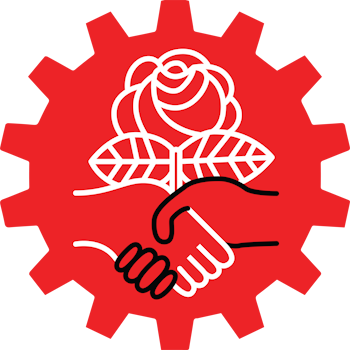This past August, Cleveland DSA sent our 7 delegates to the National Convention. Our Education Committee asked these delegates to write up reflections on their experience, which will appear here over the next month. Our next reportback is from Kevin N, who also serves on Chapter Steering!
I’m not sure if I really knew what solidarity meant before the convention. I thought I did, belligerent know-it-all that I am, but I don’t think I’d ever actually experienced it as a visceral emotional response to collective action.
And in reality, the convention had all the makings of an uncomradely affair. It was a hotly contested agenda, with deep-seated oppositional tendencies that had been organizing for months around their respective stances. Emotions and passions were running high, and the convention was not without an occasional outburst.
Both the so-called left and right wings of the convention had enthusiastic, hard-fought victories, and equally bitter, disappointing losses. And the tactics were occasionally of a questionable nature: a premeditated motion to reconsider by the sponsors of the controversial “Democratize DSA” resolution sent the delegation chamber reeling into jeers and groans, a manipulative procedural move that became the subject of complaints and criticism among much of the body, or at least among those with whom I spoke.
I found it refreshing that the general consensus was that attempts at procedural manipulations like that were roundly condemned; the aforementioned vote to reconsider was voted down by a wider margin than the failed motion itself.
Not that such machinations stopped completely, however. Towards the end of the convention, as it became increasingly clear that the allotted time was going to run out before some of the more controversial items on the agenda could be voted on, motions to extend debate on less controversial items proliferated, in addition to other delaying tactics, much to the consternation of the sponsors of those resolutions. The effort to stall was successful, however, and these resolutions were, in the end, passed to the incoming NPC.
However, when it *actually* came time to vote to adjourn (which was itself a contested motion), as soon as the convention was declared closed, the entire convention rose and applauded one another in a show of mutual respect and admiration — a spontaneous outburst that lasted longer than any celebratory display over that three day period, of which there were many.
The mood throughout the hall was unmistakably one of deep, sincere pride in and gratitude for the convention’s devotion to comradely collective decision-making, and surmounting the true logistical challenge of coordinating nearly 1,000 individuals without any major disruption throughout the three-day proceedings. Instantly, in that moment, members of the delegation dropped any animosity or frustration they may have felt toward their erstwhile opponents, and all were comrades again. With jubilant tears in our eyes, our Cleveland delegation embraced one another and the entire convention hall rejoiced in the accomplishment of collective, participatory democracy; we had all proven to ourselves through direct experience that it was, indeed, possible. That, to me, is what solidarity means.
Personally, I fall into the left wing of the restructuring effort within DSA; I’d like to see the organization move, to use the oft-repeated and generally misunderstood phrase, in a “party-like direction” (which does *not* mean immediately running candidates on our own ballot line, a common misconception amongst opponents both at the convention and after). This tendency saw its share of wins and losses at the convention, but overall, I’m very proud of its strong showing.
Moving in a party-like direction does not mean that we wish to move away from our commitment to grassroots organizing, growing our class base, or securing material victories for the working class. These goals are still paramount. It means holding DSA’s elected officials — regardless of what ballot line they run on — accountable to DSA’s platforms so that a DSA membership is more than a meaningless scout badge donned by a candidate in an attempt to gain favor with the far left electorate. We’ve seen DSA members in congress repeatedly vote directly against the interests of the working class, and we as an organization have no recourse but to impotently wag our fingers at them. What is the power in having a DSA member in elected office if they have no responsibility to uphold the democratically decided platforms of our membership?
On a more theoretical level, a fundamental transformation of society is impossible without a Socialist organization that can operate independently of the capitalist class, as any hard-fought material gains won for the working class are but temporary, revocable concessions from the ruling class. If our goal is Socialism and not mere progressivism; if we are to serve as an alternative political structure by and for the working class; if we want material, political, and hegemonic gains for the working class to be permanent and irrevocable; we will eventually have to break from the liberal confines of the Democratic Party (to reiterate, not immediately or even in the near future), and the groundwork for such a movement needs to be laid ahead of time or we will lack the structural capacity to do so if/when the historical moment to do so becomes clear. Otherwise, we will remain nothing but the left wing of a bourgeois political party and a Socialist movement in name only.
I’m confident that these principled arguments will win out in the long run — votes in favor of this tendency saw a substantial increase since the previous convention and the current NPC is now majority “partyist” — but on a more personal level, I left the convention with a new appreciation for our organization’s commitment to *actual* democracy and its capability to build an organization that will produce great, positive change for the working class.
